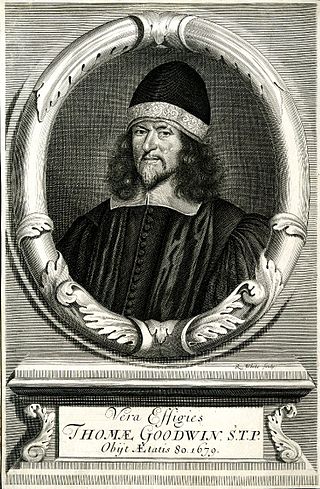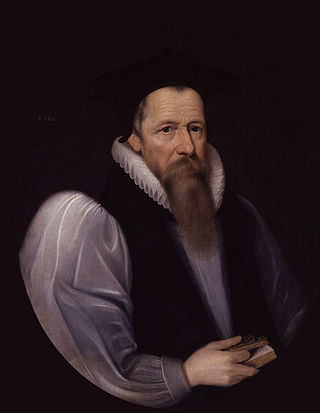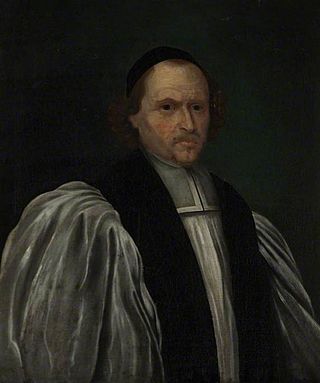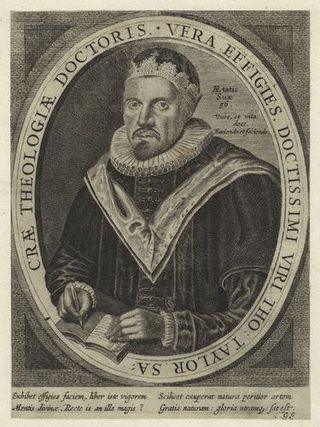Related Research Articles

Thomas Goodwin, known as "the Elder", was an English Puritan theologian and preacher, and an important leader of religious Independents. He served as chaplain to Oliver Cromwell, and was appointed by Parliament as President of Magdalen College, Oxford, in 1650. Christopher Hill places Goodwin in the "main stream of Puritan thought".

Thomas Adams (1583–1652) was an English clergyman and reputed preacher. He was called "The Shakespeare of the Puritans" by Robert Southey; while he was a Calvinist in theology, he is not, however, accurately described as a Puritan. He was for a time at Willington, Bedfordshire, and his works may later have been read by John Bunyan.

John Prideaux was an English academic and Bishop of Worcester.

John King was the Bishop of London in the Church of England from 1611 to 1621.
Richard Carpenter (1575–1627) was an English clergyman and theological writer.

John Boys (1571–1625) was Dean of Canterbury from 1619 to 1625.

William Piers was Vice-Chancellor of Oxford University from 1621 to 1624, Bishop of Peterborough from 1630 to 1632 and Bishop of Bath and Wells from 1632 until the abolition of episcopacy in 1646, then again from the Restoration in 1660 to his death in 1670.
Robert Harris (1581–1658) was an English clergyman, known as a Puritan preacher, member of the Westminster Assembly, and President of Trinity College, Oxford.
Henry Wilkinson (1610–1675) was an English clergyman, in the Commonwealth period a canon of Christ Church, Oxford, Lady Margaret Professor of Divinity, and member of the Westminster Assembly. Later he was a nonconformist preacher.

Thomas Taylor (1576–1632) was an English cleric. A Calvinist, he held strong anti-Catholic views, and his career in the church had a long hiatus. He also attacked separatists, and wrote copiously, with the help of sympathetic patrons. He created a group of like-minded followers.
George Meriton was an English churchman, Dean of Peterborough in 1612 and Dean of York in 1617.
Francis Mason (c.1566–1621) was an English churchman, archdeacon of Norfolk and author of Of the Consecration of the Bishops in the Church of England (1613), a defence of the Church of England and the first serious rebuttal of the Nag's Head Fable put about as denigration of Matthew Parker and Anglican orders.

William Leigh (1550–1639) was a well-known English preacher, graduate of Oxford, the rector of St Wilfrid's Church, from 1586 until his death, and is presumed to have baptized Mayflower Pilgrim, Myles Standish. He is now remembered for his sermon series Queene Elizabeth paraleld from 1612, which includes the first published text record for the queen's speech to the troops at Tilbury in 1588.
John Wall (1588–1666) was an English cleric.
Immanuel Bourne (1590–1672) was an English cleric.
Richard Gardiner (1591–1670) was an English divine.
Richard Mocket (1577–1618) was an English churchman and academic, warden of All Souls' College, Oxford, from 1614.
William Crashaw or Crashawe (1572–1626) was an English cleric, academic, and poet.
Dr. William Loe, sometimes written as William Leo or Lowe, was a preacher in the Stuart court. Although lesser known today than other notable preachers, such as John Donne and Lancelot Andrewes, at least a dozen of his sermons were printed and read by the public.
William Jemmat, also William Jemmet, was an English Puritan cleric and author.
References
 This article incorporates text from a publication now in the public domain : Stephen, Leslie; Lee, Sidney, eds. (1890). "Goodwin, William". Dictionary of National Biography . Vol. 22. London: Smith, Elder & Co.
This article incorporates text from a publication now in the public domain : Stephen, Leslie; Lee, Sidney, eds. (1890). "Goodwin, William". Dictionary of National Biography . Vol. 22. London: Smith, Elder & Co.